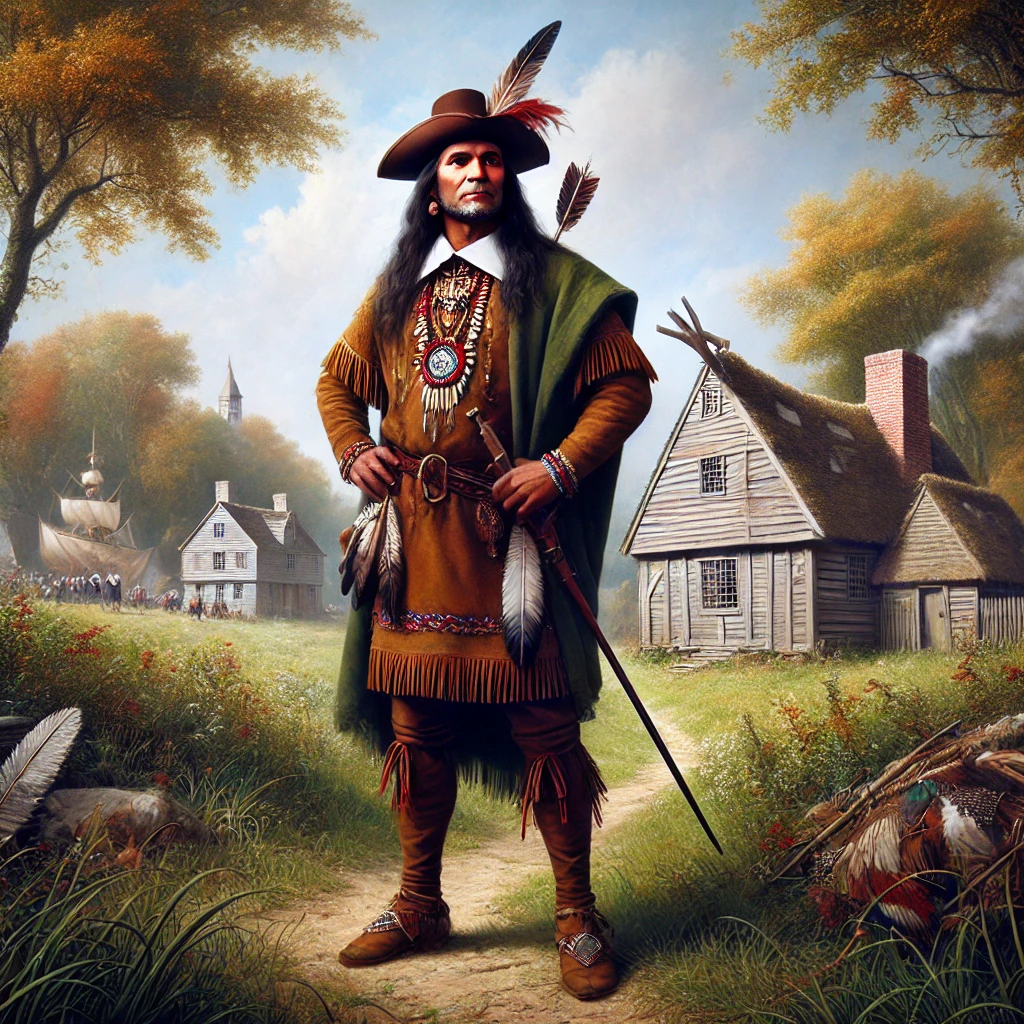Samoset watched the settlers from the edge of the woods. The trees behind him were quiet, but the wind carried the smell of smoke and wet earth. Below, the English worked in the cold. They moved slowly, tired men scraping at frozen ground with tools too heavy for their hands. They built their houses low and thin, their roofs sharp against the gray sky.
“They look weak,” Samoset said.
“They are,” Squanto said. He leaned on his spear, watching them too. “But weak men can still be dangerous.”
Samoset nodded. He thought about the ships that had come and gone over the years. He thought about the Patuxet village that had stood where this one now stood. He remembered the coughing and the fever. The silence when it was over.
“Will they listen?” he asked.
Squanto shrugged. “They will listen if they need you. If they don’t, they won’t.”
Samoset shifted his weight, looking down at the thin smoke rising from their fires. “I’ll go.”
“Be careful,” Squanto said. “These men pray with one hand and build walls with the other.”
Samoset didn’t answer. He stepped out of the trees and began walking toward the village.
The settlers saw him before he reached them. They froze, their heads jerking up like deer hearing a hunter. One man grabbed a musket. Another reached for an axe. Samoset raised his hand and kept walking.
When he was close enough, he stopped. The men stared at him. He could feel their fear. He spoke the words Squanto had taught him.
“Welcome, Englishmen.”
The men didn’t move. One of them—a thin man with a gray beard—lowered his musket slowly. “You speak English?” he said.
Samoset nodded. “I learned from the fishermen.”
The man looked at the others. They murmured to each other. Samoset waited. He didn’t fidget or look away. They didn’t seem to know what to do with him.
“I come in peace,” Samoset said. He spread his hands. “I bring no harm.”
The gray-bearded man stepped forward. His face was lined and pale. “Why are you here?”
“I wanted to see you,” Samoset said. “And to help, if you need it.”
The man looked back at his companions, then back at Samoset. He nodded. “Come,” he said.
Inside their meeting house, it smelled like damp wood and sickness. The fire in the hearth was small, the light weak. There were men and women sitting along the walls. Their clothes hung loose on their bodies. Their faces were sunken.
The gray-bearded man sat across from Samoset. He asked about the land, the rivers, the tribes. Were they friendly? Could they grow crops here? Could they fish? His questions were sharp and quick.
Samoset answered simply. He told them about the rivers and the tribes. He told them about Massasoit, the sachem, and the land. He told them that this place had once been a village, but it was empty now.
“What happened to the people here?” one of them asked.
Samoset paused. “A sickness,” he said. “A sickness that met our fathers when you came.”
The room was quiet after that.
“They will need more than words,” Squanto had told him. “Show them what they can do. But be careful. They will use what you give them, and when they don’t need you, they will shut their gates.”
Before he left, Samoset stood in the doorway, looking at their pale faces and trembling hands. He thought of the long winter ahead, the ground still frozen, the food stores nearly empty. He thought of Squanto’s warnings.
“I will bring you a deer,” he said finally. “And I will show you how to plant corn in the spring. You will need fish for the planting. I’ll show you how.”
The gray-bearded man nodded slowly. “Why would you do that?”
Samoset looked at him for a moment. “Because I can. And if I do not, you will want for food.”
He stepped outside, the cold air sharp against his skin. Behind him, the settlers murmured. He could hear their relief, cautious and small. He could overhear one younger man start to say to the grey beard, “Father, that man is a savage, he’s not even…” but he could not hear the end. It did not matter.
Squanto was waiting for him in the woods. “How was it?” he asked.
“They will listen, for now,” Samoset said.
Squanto nodded. “For now.”
Samoset turned to look back at the village, at the thin smoke rising from their fires. “Will they ever listen enough?” he asked.
Squanto’s face hardened. “No. But they will listen to what they need.”
As they walked away, Samoset glanced at Squanto. “You’ve seen more of them than I have. You’ve been on their ships, lived in their world. What did you learn?”
Squanto didn’t answer for a long time. Finally, he said, “I learned their greed. They took me to sell as a slave. I saw their cities and their stone streets. I saw men fighting over gold and land. They think the world is theirs to take.”
Samoset nodded. “And yet you came back.”
Squanto stopped. “I came back because this is my home. And because someone has to help them, or they will destroy everything.”
Samoset looked at him. “You came back to fight them.”
Squanto shook his head. “No. I came back to show them. But fighting may come.”
The woods closed around them, the trees alive with the sound of birds and the soft creak of branches in the wind. Samoset thought of the settlers and the walls they would build when they were strong enough. For now, they were saplings in the wind, bent but not broken.
He would bring the deer. He would teach them to plant. But he would not forget Squanto’s words.
“They will not stay weak forever.”


